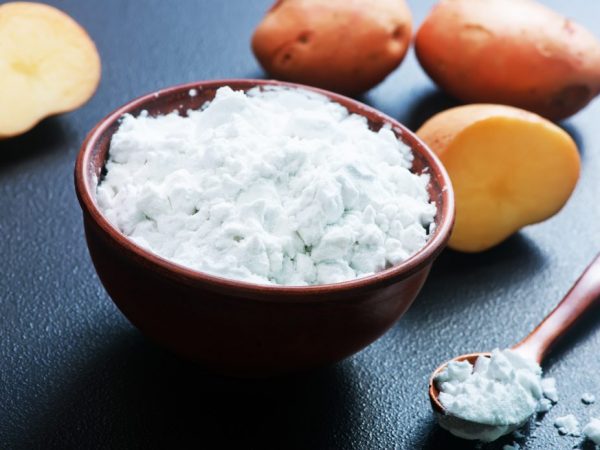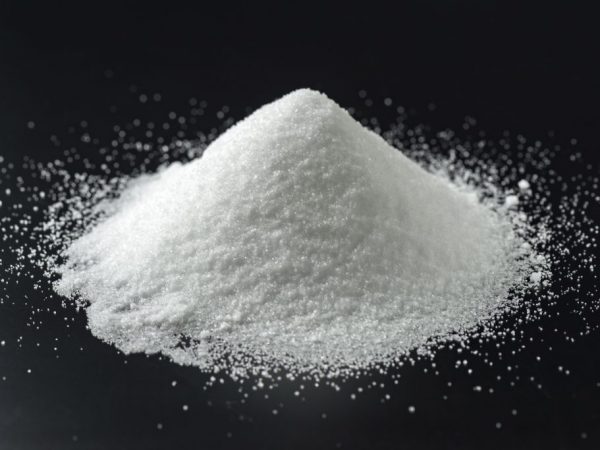What are the benefits and harms of potato starch
Starch is essential for a healthy diet. It controls carbohydrate balance and restores energy expenditure, is rapidly absorbed and contains amylopectin with amylose. People should know what are the benefits and harms of potato starch before consuming it.

The benefits and harms of potato starch
About the product
Starch is a white, loose powder found in the form of grains in potato fruits. The grains are found near the hide and peephole. They are oval or round, with grooves on the outside. The coarser the grains, the better the quality of the product. Its number should be 15-100 microns.
Due to its chemical structure, potato starch is ranked among the highly digestible carbohydrates. Amylopectin and amylose are natural components in starch.
The product is divided into 2 moisture groups:
- Group A. Product moisture - from 38% to 40%.
- Group B. Humidity - 50-52%.
The product is divided into 3 types of raw materials:
- Grades 1 and 2 have a good smell and bright white color;
- type 3 is a gray product with a sour aroma.
Starch use
Starch has been used since ancient times. It is popular as a burn remedy. In the industry, the product is used for the preparation of various dishes, mainly pies, cakes, pies, buns and jelly.
Benefit
The product benefits the body if it is eaten in its natural form. A refined product is harmful in large quantities, but it is customary to use it for cooking various dishes.
Are the properties of potato starch beneficial? A number of facts speak in his favor:
- Grains of the product contain potassium.
- The product can significantly reduce blood and liver cholesterol levels. It has anti-sclerotic effects on health.
- It removes excess water from the body. This property is especially useful for people with kidney problems, as well as at the time of a hangover.
- A large number of unrefined carbohydrates in the product helps the body during the onset of inflammatory processes, at the time of the development of a tumor, as well as pathogenic cells.
- The presence of starch in the intestines decreases the rate and absorption of sugar in the blood.
- Starch feeds the body with carbohydrates.
- The product supports and strengthens the immune system.
- Starch is involved in the production of riboflavin and in stimulating the integrity of vitamin B2. It promotes proper metabolism and digestion.
- Boiled potatoes contain vitamin C.
- The product helps to reduce acidity in the intestines and has a gripping effect, which reduces the likelihood of stomach ulcers.
Harm

Starch is high in carbohydrates
There are no absolutely healthy products. Starch contains a large number of carbohydrates, due to which it quickly restores a person's need for energy, but if you consume large quantities of potatoes, the body will begin to accumulate energy that a person will not have time to spend, which will lead to the appearance of fatty deposits.
Modified starch is obtained from potatoes by refining, it increases the level of inulin in the body, promotes the development of atherosclerosis, interferes with the hormonal background and kills the walls of blood vessels. It increases the chances of many diseases, especially those related to the stomach and intestines, and also causes upsetting of the digestive system.
Carbohydrates weaken the internal organs, which leads to colds, nausea, vomiting, even choking and speech disorders, vision.
The amount of the element in food at the time of heating increases the risk of developing cancer. In order for the body to be able to qualitatively digest all starch products, it needs to use blood enzymes that improve the nervous system and help the body cope with stress and depression.
Is it possible for starch for children
Natural element in moderation does not harm the health of babies. It is often used to prepare baby food because it:
- promotes the removal of fluid from the body;
- helps to digest unfamiliar food;
- protects against possible diarrhea;
- promotes brain function;
- protects the child's stomach from the effects of organic acids.
The carbohydrate content in the diet for children is small, about 3% -10%.

